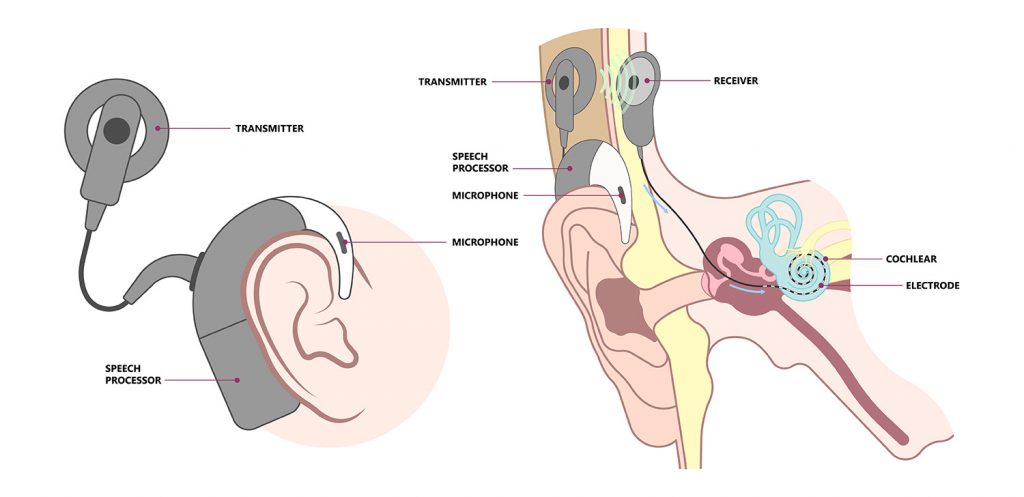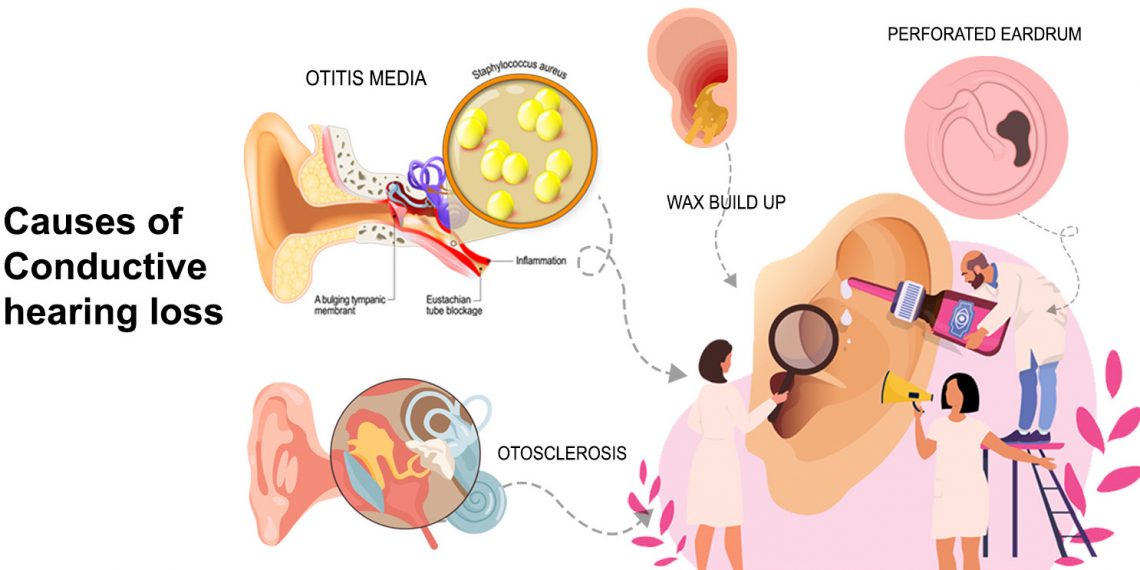Conductive hearing loss is a type of hearing impairment that occurs when sound is not properly conducted through the outer ear, middle ear, or both. It is often caused by problems in the physical structures of the ear, such as a blockage in the ear canal, a hole in the eardrum, or damage to the bones in the middle ear. Conductive hearing loss can often be treated with hearing aids, and here are some examples of conductive hearing loss that can be treated with hearing aids.
Wax buildup: A common cause of conductive hearing loss is a buildup of earwax in the ear canal. A hearing aid can help amplify sounds for individuals with this type of hearing loss by bypassing the blockage and directing sound into the ear.
Otitis media: Otitis media, also known as middle ear infection, can cause fluid buildup in the middle ear, leading to conductive hearing loss. In some cases, a hearing aid can help improve hearing by amplifying sounds and bypassing the fluid.
Perforated eardrum: A perforated eardrum can cause conductive hearing loss and is often treated with a hearing aid. The hearing aid can help improve hearing by amplifying sounds and bypassing the hole in the eardrum.
Otosclerosis: Otosclerosis is a condition in which the bones in the middle ear become stiff and stop conducting sound effectively. A hearing aid can help improve hearing by amplifying sounds and bypassing the damaged bones.
Malformation of the ear: In some cases, individuals may be born with a malformation of the outer or middle ear that causes conductive hearing loss. A hearing aid can help improve hearing by amplifying sounds and bypassing the affected structures.
It is important to note that not all cases of conductive hearing loss can be treated with hearing aids and some may require surgical intervention. It is crucial to consult with an audiologist or an ear, nose, and throat (ENT) doctor for an accurate diagnosis and the best course of treatment for your specific case of conductive hearing loss. The audiologist will also be able to recommend the best type of hearing aid for your particular needs and help you adjust to using the device.
Conductive hearing loss can be treated with hearing aids in some cases, and these include wax buildup, otitis media, perforated eardrum, otosclerosis, and malformation of the ear. It is important to seek professional help to determine the cause of your conductive hearing loss and the best course of treatment, which may or may not involve the use of a hearing aid.
How Can I Find The Type of Hearing Aid That Best Fits My Condition?

Finding the right hearing aid that best fits your specific condition can be a challenging task, but with the help of an audiologist, you can find the right solution. Here are some steps you can take to find the type of hearing aid that is best suited for your needs:
Schedule a hearing evaluation: The first step to finding the right hearing aid is to schedule a hearing evaluation with an audiologist. The audiologist will assess your hearing ability, determine the cause of your hearing loss, and determine the best type of hearing aid for your specific needs.
Consider the degree and type of hearing loss: The type of hearing loss you have will determine the type of hearing aid that will best suit your needs. For example, if you have a mild hearing loss, a behind-the-ear (BTE) or in-the-ear (ITE) hearing aid may be sufficient, whereas a severe hearing loss may require a more powerful BTE hearing aid.
Take into account your lifestyle and preferences: Consider your lifestyle and personal preferences when choosing a hearing aid. For example, if you are physically active, you may want to consider a BTE hearing aid that is sweat-resistant and durable. On the other hand, if you prefer a more discreet device, you may prefer an ITE or in-the-canal (ITC) hearing aid that is less noticeable.
Consider your budget: Hearing aids can be expensive, and it is essential to consider your budget when choosing the right device. Some hearing aids come with a higher price tag due to their advanced features and technology, but there are also more budget-friendly options available.
Try out different models: Once you have determined the type of hearing aid that best fits your needs, it is important to try out different models to find the right fit. Your audiologist will be able to provide you with a range of hearing aids to try, and you should take advantage of this opportunity to find the right device for you.
Choose a reputable supplier: When choosing a hearing aid, it is important to choose a reputable supplier that can provide you with the support you need throughout the process. Look for a supplier that has a good reputation, offers a warranty, and has a team of professionals who can answer any questions you may have.
Finding the type of hearing aid that best fits your condition requires some research and the help of an audiologist. Consider the degree and type of hearing loss, your lifestyle and preferences, your budget, try out different models, and choose a reputable supplier to find the right device for you. With the right hearing aid, you can improve your hearing and enhance your quality of life.




